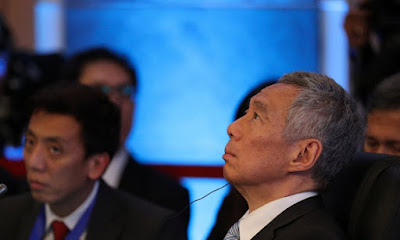Kuala Lumpur advances "durian diplomacy" to supply a bigger share of spiking Chinese demand for the pungent fruit
Musang King, a premium variety of durian, is all the rage in China. Durians and durian-based products such as pastries, desserts and confectionery are among the most searched for items on Taobao, China’s biggest e-commerce platform, and surging Chinese demand for the spiked fruit could drive a major transformation of Malaysian agriculture in the years ahead.
Malaysian officials have recently advanced so-called “durian diplomacy” in hopes of winning a bigger share of China’s market. Currently, China does not permit the import of fresh durians from Malaysia, allowing only for frozen fruit pulp. But if negotiations with Chinese authorities to allow whole fruit exports succeed, Malaysia could soon enjoy a new type of commodity boom.
Neighboring Thailand currently has a near monopoly on China’s durian market. That’s in large part because the country is permitted to export whole fruit durian harvested from trees before ripening. Malaysia’s durian farmers, by contrast, traditionally harvest only when the fruit drops to the ground; China believes the fallen-fruit harvesting method risks exposure to dirt and pests.
Malaysian Agriculture Minister Ahmad Shabery Chee believes the prohibition could be lifted some time year, according to media reports quoting him in November. Known in Malaysia as the “King of Fruits”, officials have put high priority on courting their Chinese counterparts to expand Malaysia’s market access.
China’s new ambassador to Malaysia, Bai Tian, was treated to a durian feast earlier this month at an orchard in Bentong, a budding eco-tourism destination in Pahang, the country’s top durian-growing state. The town, roughly an hour’s drive from Kuala Lumpur, hosted an annual international durian tourism festival last year that drew huge crowds.
Nile Bowie is a writer and journalist with the Asia Times covering current affairs in Singapore and Malaysia. He can be reached at nilebowie@gmail.com.
Musang King, a premium variety of durian, is all the rage in China. Durians and durian-based products such as pastries, desserts and confectionery are among the most searched for items on Taobao, China’s biggest e-commerce platform, and surging Chinese demand for the spiked fruit could drive a major transformation of Malaysian agriculture in the years ahead.
Malaysian officials have recently advanced so-called “durian diplomacy” in hopes of winning a bigger share of China’s market. Currently, China does not permit the import of fresh durians from Malaysia, allowing only for frozen fruit pulp. But if negotiations with Chinese authorities to allow whole fruit exports succeed, Malaysia could soon enjoy a new type of commodity boom.
Neighboring Thailand currently has a near monopoly on China’s durian market. That’s in large part because the country is permitted to export whole fruit durian harvested from trees before ripening. Malaysia’s durian farmers, by contrast, traditionally harvest only when the fruit drops to the ground; China believes the fallen-fruit harvesting method risks exposure to dirt and pests.
Malaysian Agriculture Minister Ahmad Shabery Chee believes the prohibition could be lifted some time year, according to media reports quoting him in November. Known in Malaysia as the “King of Fruits”, officials have put high priority on courting their Chinese counterparts to expand Malaysia’s market access.
China’s new ambassador to Malaysia, Bai Tian, was treated to a durian feast earlier this month at an orchard in Bentong, a budding eco-tourism destination in Pahang, the country’s top durian-growing state. The town, roughly an hour’s drive from Kuala Lumpur, hosted an annual international durian tourism festival last year that drew huge crowds.






